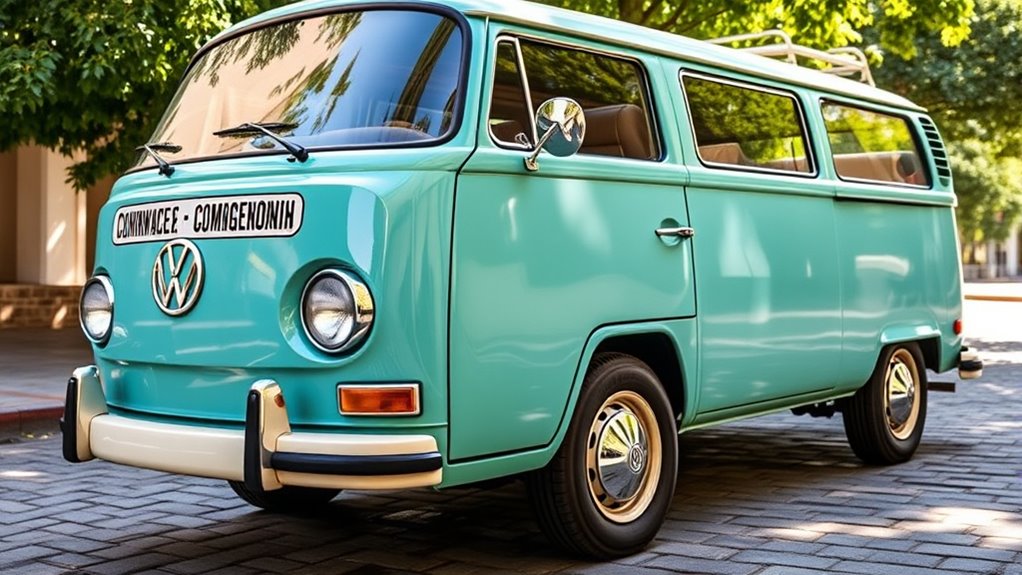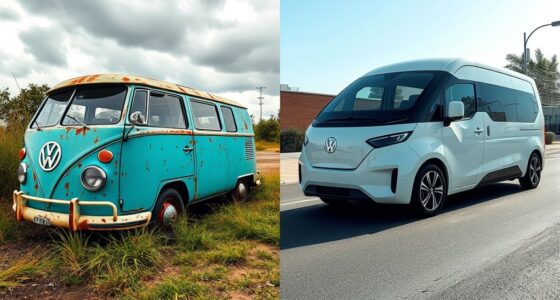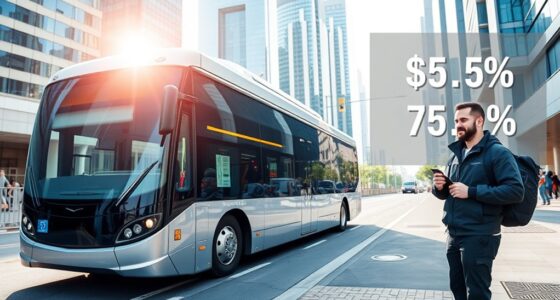Classic VW buses are increasingly valuable, thanks to their nostalgic appeal and growing demand among collectors. If you invest wisely, focusing on authentic, well-maintained models, your chances of a good return improve considerably. Restoration costs can be high, but owners who preserve originality often see better appreciation over time. Market trends and rarity play key roles in value. Want to discover how to make the most of this vintage investment? Keep exploring to learn more.
Key Takeaways
- Increasing popularity among collectors and enthusiasts has driven up classic VW bus prices and investment potential.
- Authentic, well-maintained models retain value better and tend to appreciate more than heavily restored or modified versions.
- Rarity of specific models and original condition significantly enhance market value and investment returns.
- Restoration costs can be high, so careful management is essential to avoid exceeding the vehicle’s market value.
- Market trends and demand fluctuations require ongoing monitoring to maximize investment opportunities in classic VW buses.

If you’re looking for a unique investment opportunity, classic VW buses might just be worth considering. These vintage vehicles have experienced a notable surge in popularity, driven by nostalgia, pop culture, and a growing appreciation for retro aesthetics. However, before jumping in, it’s vital to understand the factors that influence their value. One of the main considerations is the restoration costs involved in bringing these buses back to their original condition. Restoring a classic VW bus can vary considerably depending on its current state, rarity, and the level of authenticity you desire. Some projects might require only minor cosmetic work, which can be relatively affordable, while others may need extensive repairs or complete rebuilds, leading to higher expenditure. As you evaluate potential purchases, keep in mind that restoration costs can sometimes outweigh the vehicle’s market value if not carefully managed.
Market trends play a pivotal role in determining whether investing in a classic VW bus is a smart move. Over recent years, these vehicles have seen a steady increase in demand, especially among collectors and enthusiasts who view them as more than just transportation—they’re a symbol of freedom and a lifestyle. This rising interest has pushed prices upward, making them a potentially lucrative investment. However, market trends can fluctuate, influenced by broader economic conditions and shifting consumer preferences. It’s wise to monitor the market closely and consider factors such as seasonal demand spikes, rarity of specific models, and cultural influences that might impact future prices.
When evaluating the investment potential of a classic VW bus, you should also consider the maintenance costs and the availability of parts. As these vehicles age, finding authentic parts can be challenging and sometimes expensive, which adds to overall ownership costs. Yet, the persistent demand means that well-maintained, original models tend to retain their value better than heavily modified or poorly restored ones. If you’re aiming for appreciation over time, focus on acquiring a bus that’s as close to original as possible, even if it means paying a premium initially. This approach aligns with current market trends and can help guarantee your investment appreciates in value.
Frequently Asked Questions
How Do I Verify the Authenticity of a Vintage VW Bus?
To verify the authenticity of a vintage VW bus, start with thorough restoration tips, checking for original parts, paint, and badges. Research market trends to see if the bus matches authentic features from its era. Ask for detailed documentation or receipts of restorations, and consult classic VW experts or online forums. A genuine vintage bus will have consistent, well-documented details that align with its model and age.
What Are the Most Valuable Models and Years to Invest In?
Imagine you buy a 1967 VW Bus, knowing it’s rare and sought after. Its value increases as market trends favor vintage vehicles, but restoration costs can be high. The most valuable models are from the late 1950s and 1960s, especially those with original features. Investing in these years can be smart if you balance restoration costs with the potential appreciation in value over time.
How Much Maintenance Do Classic VW Buses Typically Require?
You’ll find that classic VW buses typically need regular maintenance, especially as they age. Restoration costs can add up if you’re restoring or maintaining a vintage model, but parts availability is generally good thanks to a dedicated community. Expect to spend on engine checks, brake work, and body repairs. Staying on top of these tasks helps preserve the bus’s value and keeps it running smoothly for years to come.
Are There Legal Restrictions on Importing Vintage VW Buses?
Navigating import restrictions is like sailing through uncharted waters. You need to stay on course with import regulations, which vary by country. Some places impose restrictions on vintage VW buses based on age, emissions, or safety standards. Before importing, check specific laws and possible tariffs. Ignoring these rules could sink your efforts, so research thoroughly to guarantee smooth sailing ahead.
What Are the Common Issues That Affect the Value of These Vehicles?
You should know that common issues affecting vintage VW buses’ value include rust, engine problems, and originality. Restoration costs can be high if you need extensive repairs, which may impact your investment. Market fluctuations also influence their worth, so prices can rise or fall unexpectedly. To protect your investment, keep the vehicle well-maintained and preserve its originality whenever possible.
Conclusion
So, as the classic VW Bus continues to climb in value, it’s clear it’s more than just a nostalgic icon—it’s a smart investment. Think of it as planting a seed that blooms into a vintage treasure, growing richer with each passing year. If you’re ready to ride the wave of nostalgia and potential profit, securing a well-maintained VW Bus now could turn your passion into a timeless asset that’s as enduring as its legendary charm.









